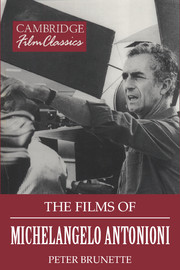Introduction
Published online by Cambridge University Press: 05 June 2012
Summary
Michelangelo Antonioni, who first gained prominence on the international cinema scene in the 1960s, has become the very symbol of that increasingly rare form, the art film, and of all that the cinema has ever sought to achieve beyond mere entertainment. Along with the films of Ingmar Bergman, Federico Fellini, the directors of the French New Wave, and a few others, Antonioni's films were, during the 1960s, absolutely essential to the cultural life of the educated elite around the world. His work, especially, has carried both the cachet and the condemnation of being particularly “artistic” – that is, symbolic, indirect, metaphysical, and even downright confusing.
Antonioni's early interpreters saw his films primarily as an expression of “existential angst” or “alienation.” (Pierre Leprohon, for example, speaks of “the anguish of existence.”) In the mid-1960s this was undoubtedly the appropriate tack to take toward films that insisted, in what seemed to be an entirely new manner, on dealing overtly with a certain philosophically inflected Weltanschauung in a popular, commercial medium.
Now, however, we can see that this manner of regarding Antonioni's films as transhistorical artifacts is itself not transhistorical but is typical of critical response to the art-film milieu of the period. In other words, his films came to be viewed in this way not only because of their own inherent features, but also because of the period's interpretive frame – at least as posited by critics whose primary interest was aesthetic or formal, rather than political.
- Type
- Chapter
- Information
- The Films of Michelangelo Antonioni , pp. 1 - 27Publisher: Cambridge University PressPrint publication year: 1998

